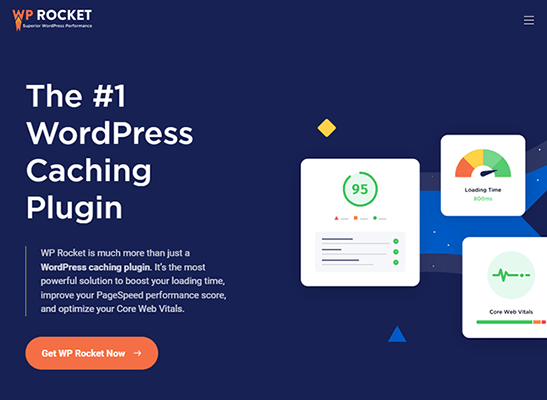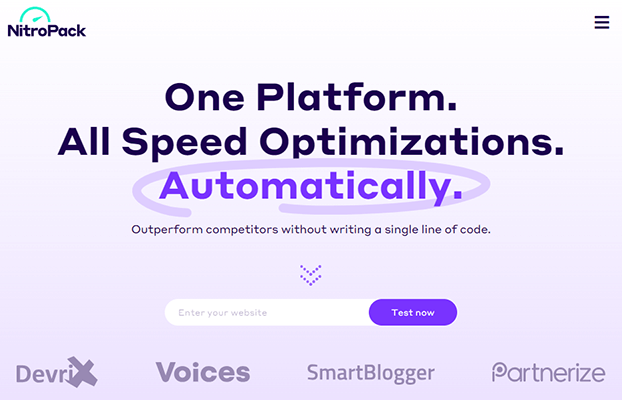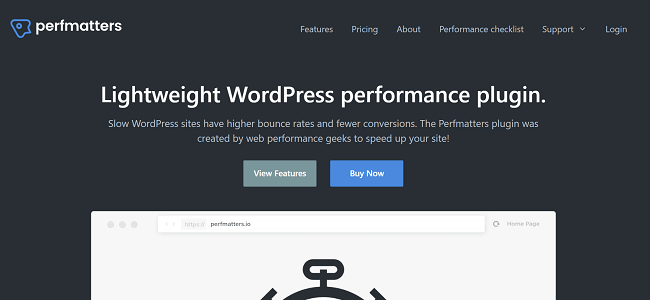10 Best WordPress Speed Optimization Plugins (2024 Comparison)

Want to speed up your WordPress website? You’re going to need the right plugins and tools to help you.
In this post, you’ll find the best WordPress speed optimization plugins for this very job. You’ll find a mix of free and paid plugins.
And if you’re not too tech savvy, don’t worry because some of these plugins can improve WordPress performance with a few clicks – no need to become a web developer.
The best WordPress speed optimization plugins
TL;DR:
For most WordPress websites, I recommend using a combination of WP Rocket and Perfmatters. WP Rocket takes care of the regular caching and optimization tasks while Perfmatters takes care of the optimizations nobody usually thinks of doing.
For example, Perfmatters allows you to disable scripts on taxonomies that don’t need them, load Google Analytics locally, etc. Very useful!
If you want to see the most significant WordPress performance improvements or want a one-click solution to speed up WordPress, NitroPack is your best option. It’ll optimize your code, images, and deploy a CDN.
NitroPack is ideal for those running resource heavy plugins such as page builders or notoriously slow WordPress themes. This is as easy as it gets!
1. WP Rocket

WP Rocket is the best WordPress performance plugin for most users.
You get all of the caching functionality you’d expect, along with a bunch of features you probably wouldn’t expect.
… All wrapped in the most user-friendly interface I’ve seen in a WordPress plugin like this.
Where some WordPress caching plugins seem to require you to study an entire course to figure it out – WP Rocket makes the setup process real easy by comparison.
I love that it includes features you’d normally have to install a few extra plugins for. For example, you won’t need a separate lazy loading plugin or database optimization plugin – these features are included.
There are some advanced features that are quite easy to implement. This includes delaying Javascript execution time which can have a huge impact on page load times and Core Web Vitals.
WP Rocket is well worth exploring if you want a speed optimization plugin that does it all. After installing WP Rocket on my WordPress site, I was able to uninstall 3 other plugins.
Features:
- User-friendly interface
- Minimal tweaking required for speed improvements
- Minify CSS, HTML and Javascript
- Page caching
- Cache pre-load
- Image lazy loading
- Advanced caching rules
- WordPress database optimization
- CDN integration
- Direct Cloudflare integration
- Google Analytics integration to load the code from your server
- Settings import and export
- Version rollback
- Delay Javascript execution time
Price:
From $59.
Learn more in our WP Rocket review.
2. NitroPack

NitroPack is more than a WordPress performance plugin, it is a complete speed optimization platform.
The idea behind this platform is to simplify the process of speeding up websites. Instead of using several plugins and having to manually decide what to optimize, NitroPack optimizes everything for you.
Just add your website, and install the connector plugin. You can then choose how aggressive you want the optimizations to be.
NitroPack will then start optimizing your site automatically. It will Implement a global CDN, various caching types, minification, compression, image optimization, serving images in next-gen formats (e.g. SVG), DNS prefetch, deferring of JavaScript, etc.
And all of these optimizations are run by their servers so it reduces your own server usage.
All of these changes can improve time to first byte (TTFB), minimize main-thread work, improve your Web Core Vitals and more.
To squeeze out even more performance you can customize the settings but even on the “strong” setting you will see huge improvements in page load times and Google PageSpeed scores.
And, in our review, Colin was able to reduce load times by over 3 seconds using Elementor. Using GeneratePress I was able to get my mobile PageSpeed score in the 90’s.
Note: There is a free plan but it adds a ‘powered by’ badge to your footer. It is enough for small sites or testing purposes but I highly recommend getting a paid plan to remove the badge.
Features:
- Automatic website optimization
- Supports WordPress and other content management systems
- Global CDN included and automatically configured
- Various caching types (page, browser, and more)
- Advanced resource loader
- Automatic image optimization
- Convert images to next gen formats such as WebP
- Adaptive image sizing
- DNS prefetching
- Defer JS loading
- HTML, JS and CSS minification
- HTML, CSS and JS compression
- Compatible with advertising scripts
- Development API
Price:
Free plan available for very small sites or testing purposes but adds a powered by badge to your footer. Paid plans remove the badge and offer more resources.
Badge can be removed by becoming a beta tester. This also increases resources for free plan users.
Learn more in our NitroPack review.
3. Perfmatters

Perfmatters is a WordPress optimization plugin that takes a different approach to improving page load times than most others on this list.
By default, WordPress has certain options enabled that aren’t necessary for most sites and slow down performance. Perfmatters makes it possible to disable these options with the click of a few buttons.
But, the biggest thing that tends to slow down the rendering of your pages is HTTP requests that aren’t needed.
Perfmatters also allows you to disable these scripts on a per page basis. This means you can stop plugins from loading code where it isn’t needed.
You can also take advantage of performance boosting features like DNS prefetch, preconnect, local Google Analytics script hosting, and more.
So, even if you have a WordPress caching plugin installed – you should use Perfmatters too.
Note: Using Perfmatters and WP Rocket, I was able to take one of my smaller sites from a PageSpeed score of 59 to 95. Not bad, right?
Features:
- Works with your existing caching plugin
- Allows you to Host Google analytics code from your own site
- Disable WordPress options that are slowing your site down
- Disable scripts on per page/post basis
- Supports advanced performance boosting functionality such as DNS prefetch and preconnect
- REST API control
- Heartbeat control
- Lightweight plugin
Price:
Starts from $24.95/year.
4. WP Fastest Cache

WP Fastest Cache is a performance plugin with a focus on caching. It comes with a great set of features, balanced with ease of use.
Some plugins are too basic, others are too advanced – the developer of this plugin has definitely found the middle ground.
Just install, activate and run through the settings. Then hit save and you’re ready to go.
I especially like how easy it is to set cache expiration times for certain URL strings.
And it gets better, because this plugin is used by over 1 million people and receives great reviews on WordPress.org.
Features:
- Easy setup
- 1-click to clear cache and/or minified CSS etc
- Minify CSS and HTML
- Set posts/pages to exclude (some like admin area excluded by default)
- Set expiration times for all posts/pages or certain URL strings
- CDN integration
- Premium version available with extra features
Price:
Free.
5. Cache Enabler

Cache Enabler is a great plugin from the team at KeyCDN.
It’s a light weight caching plugin that you can setup in minutes.
It comes with the option to set cache expiry time, minification setup and a few other options. Other than that, it’s sparce on features but that’s the entire point of this plugin.
If you need to add a content delivery network service, you can use the sister plugin to this called CDN Enabler. Same principle applies – light weight and easy to setup.
Features:
- Simple setup
- 1-click to clear cache
- Set cache behaviour (e.g. clearing after new posts)
- Minification feature
- Set post ID’s to exclude from cache
- Set expiration times
Price:
Free.
6. WP Super Cache

WP Super Cache is one of the most widely used caching plugins available for WordPress. At the time of writing this post it has had over 5.5 million downloads.
It’s straight forward to setup but has some settings for advanced users which can be used to get more out of the plugin.
Features:
- Support for multiple caching types (Mod_Rewrite, PHP and Legacy)
- Browser caching
- Serve static html files
- Cache preload
- CDN support
Price:
Free.
7. W3 Total Cache

W3 Total Cache is another popular WordPress speed optimization plugin. It goes beyond just being a simple caching plugin functionality such as browser caching.
There’s a huge array of options and various caching methods that are supported.
There’s advanced support for CloudFlare and other CDN services.
But, the reality is that because there are so many options, it’s not the easiest to setup. And if you don’t know what you’re doing, you could break something. That’s why I recommend this plugin to advanced users.
It’s also worth noting that uninstalling this plugin is difficult – it takes more than the typical deactivating and deleting to get rid of it.
Features:
- CDN Support
- Browser caching
- Database caching
- Object caching
- Minifying
- And lots more
Price:
Free.
8. WP Super Minify

WP Super Minify helps specifically with the minification of HTML, JavaScript, and CSS files.
The idea of minifying is to combine JS, HTML and CSS files so that they can be compressed and served to visitors in a way that reduces website loading times.
It’s worth noting that you should be very careful when setting up these types of plugins. Some other plugins and themes don’t always behave well with this type of plugin.
As such, I’d recommend testing this on a staging site first. Which is good practice in general.
Some of the other plugins on this list do have these features built-in, but WP Super Minify is ideal if you currently use a caching plugin that doesn’t offer minification.
Features:
- Minifies JavaScript, CSS and HTML
- Option to disable compression of CSS/JavaScript
- Extremely straight forward and easy to use.
Price:
Free.
9. Smush

Smush is based on the Yahoo Smush.it service which is used to optimize images and remove unnecessary bytes from image files.
Most tools use ‘lossy’ formats which degrade quality, but Smush uses lossless formats so you won’t be able to notice any difference in quality.
Features:
- Strips un-used colour from images
- Strips meta data from JPEG’s (this isn’t needed anyway)
- Optimizing JPEG compression
- Integrates with the Smush.it API
- Choose to run existing images through the plugin
Price:
Free plugin.
10. LazyLoad by WP Rocket

Usually when a visitor hits your website and tries to load a page it will load the entire page.
If it’s a long page with lots of images this can cause your loading times to skyrocket.
The truth is that you don’t actually need the entire page to load at the same time, especially images which usually take the most time to load.
The idea of lazy loading is that specific elements are only loaded when they are needed. And that’s what LazyLoad by WP Rocket will do.
One interesting feature is that you can replace your YouTube iFrames with preview thumbnails.
It’s worth noting that certain WordPress speed optimization plugins will include some sort of lazy load feature. If your host forces you to use their in-house caching plugin, LazyLoad is a good way to enable this type of feature without causing issues with your hosting.
Features:
- Replaces post images, post thumbnails, etc.
- No use of jQuery or Javascript so it’s ultra light-weight
- YouTube iFrames can be replaced with preview thumbnails
Price:
Free plugin.
Bonus: 4 top tools to test the speed of your website
This including one of these WordPress performance plugins and hoping for the best isn’t enough. You need benchmark your website speed.
This post is all about showing you WordPress plugins that you use for caching your website, minifying elements of your site and setting up things like lazy loading – all plugins that will speed up the page loading times of your website.
But how will you know if they’ve improved the speed of your website? For that you’ll need a performance testing tool.
Here are some of my favorite speed test tools:
Google’s PageSpeed Insights tool is particularly useful because it incorporates real-world data, and displays your Core Web Vitals.
But, any of these tools will do the job.
Choosing the best WordPress speed optimization plugin for your website
If you’re struggling to speed up your site, just one of these WordPress performance plugins can have a dramatic improvement on your page load times.
It’s important to point out that you shouldn’t go ahead and install all of these. Only install what you need and remember that less is more. It’s definitely true that there are other ways to speed up your site but some of these plugins are a great way to start.
NitroPack offers the best performance increase and implements optimizations for you including a global CDN. They have a free plan for small sites.
If you want to reduce costs and improve page load times significantly, an effective combo would be WP Rocket and Perfmatters. These optimization plugins will put a lot of functionality at your finger tips – caching, lazy loading, and more. And it’s worth noting that if you host with Kinsta, WP Rocket is the only caching plugin they allow.
Using these two plugins I was able to take one of my smaller sites from a page speed score of 59 to 95 on mobile. Amazing.
On the other hand, if you’re looking for a free WordPress performance plugin, be sure to start off with a caching plugin like WP Fastest Cache. It’s simple to use even if you’re a beginner.
There are plenty more ways to speed up your WordPress website. Next up, I recommend checkout our roundup of the best content delivery networks (otherwise known as CDN’s) – these can dramatically speed up page load times.
But I’d also recommend checking out our post on WordPress image optimization plugins as well. Most speed plugins don’t include this feature.
Disclosure: Our content is reader-supported. If you click on certain links we may make a commission.
